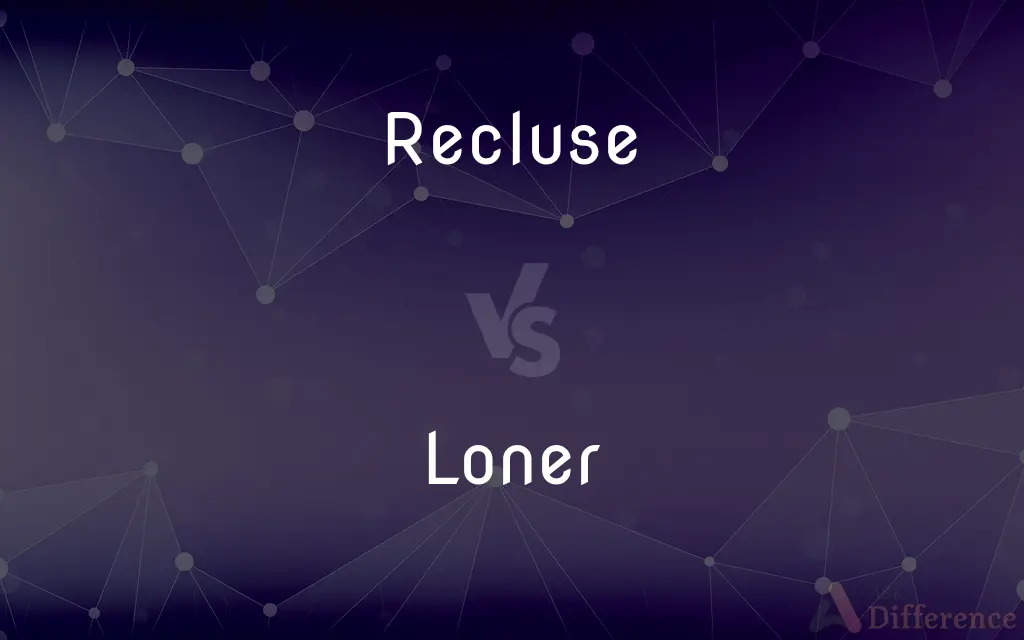Recluse vs. Loner — What's the Difference?
By Fiza Rafique & Maham Liaqat — Updated on March 11, 2024
A recluse intentionally avoids society for personal peace, often driven by deeper psychological reasons, whereas a loner prefers solitude but may engage socially, driven by personal choice without deeper issues.

Difference Between Recluse and Loner
Table of Contents
ADVERTISEMENT
Key Differences
A recluse is someone who chooses to live in isolation from society, often due to personal or psychological reasons that make social interaction challenging or undesirable. This choice is typically rooted in a deep need for solitude or a response to past traumas. On the other hand, a loner is an individual who prefers to be alone but does not necessarily avoid social situations out of fear or trauma. Loners might enjoy social interaction on their terms and do not feel the need to be part of a community to feel fulfilled.
Recluses often create environments where external social interactions are minimized or entirely absent, seeing solitude as essential for their mental health or personal fulfillment. Whereas, loners might find themselves in social environments but choose to engage minimally, valuing their alone time without completely isolating themselves from the world.
The decision for someone to become a recluse can stem from negative experiences with societal interactions, leading to a life of solitude. In contrast, being a loner is usually a matter of personal preference, without the same depth of psychological aversion to social interaction. Loners can interact with others but prefer limited social engagements.
While recluses might actively seek out physical spaces that support their isolation, like remote homes, loners do not necessarily adjust their physical surroundings to avoid people. Instead, loners might simply prefer engaging in activities alone but can do so in various settings.
Recluses and loners both place a high value on solitude, but their motivations and the extent of their isolation differ significantly. A recluse's lifestyle is a profound commitment to solitude, often necessitated by personal issues, whereas a loner's solitude is a preference that allows for occasional social interaction.
ADVERTISEMENT
Comparison Chart
Definition
Chooses isolation from society for peace or due to psychological reasons.
Prefers solitude but doesn’t strictly avoid social interactions.
Social Interaction
Minimized or absent, often due to past traumas.
Limited by choice, without significant aversion.
Motivation for Solitude
Deep need for peace or psychological reasons.
Personal preference without deeper issues.
Adjustment to Physical Space
May seek remote locations for complete isolation.
Does not necessarily change physical space for solitude.
View on Community
Often views social interaction as unnecessary or harmful.
May enjoy social interaction in limited amounts, does not seek community engagement.
Compare with Definitions
Recluse
A person who lives in voluntary seclusion from the public and society.
The millionaire recluse lived in a remote mansion, away from the bustling city.
Loner
A person who prefers being alone but does not completely shun social interaction.
The loner often spent lunch breaks in the park, enjoying solitude amidst the city’s chaos.
Recluse
An individual whose lifestyle is characterized by minimal social contact.
The recluse rarely left his house, preferring the company of books over people.
Loner
Someone who values independence and solitude without significant psychological aversion to people.
As a loner, he enjoyed solo hikes, though he occasionally joined group treks.
Recluse
Someone who finds solace in isolation due to personal or psychological reasons.
After a tumultuous public life, the artist became a recluse, finding peace in solitude.
Loner
Does not necessarily seek to change their environment for solitude.
The loner lived in a city apartment, finding moments of solitude in the early morning hours.
Recluse
Typically involves creating a life away from community or societal norms.
The recluse had his groceries delivered to avoid venturing into town and interacting with others.
Loner
Chooses limited social engagement, often out of preference rather than necessity.
The loner attended the party but spent most of the evening on the balcony, observing from a distance.
Recluse
Often associated with a desire to escape from societal pressures or past traumas.
She became a recluse, retreating into her secluded world to heal from past hurts.
Loner
Can engage in social situations on their own terms without seeking isolation.
Despite being a loner, she occasionally enjoyed coffee dates with close friends.
Recluse
A recluse is a person who lives in voluntary seclusion from the public and society. The word is from the Latin recludere, which means "shut up" or "sequester".
Loner
A loner is a person who does not seek out, or may actively avoid, interaction with other people. There are many potential reasons for their solitude; intentional reasons include being preoccupied with the accumulation of wealth or introverted, mystic, spiritual, religious, and personal considerations.
Recluse
A person who lives a solitary life and tends to avoid other people
She has turned into a virtual recluse
He's a bit of a recluse
Loner
One who avoids the company of other people.
Recluse
Favouring a solitary life.
Loner
One who is alone, lacking or avoiding the company of others.
I actually enjoy being a loner.
Recluse
A person who withdraws from the world to live in seclusion and often in solitude.
Loner
A person who avoids the company or assistance of others
Recluse
Withdrawn from the world; reclusive.
Recluse
Sequestered; secluded, isolated
A recluse monk or hermit
Recluse
Hidden, secret
Recluse
A person who lives in self-imposed isolation or seclusion from the world, especially for religious purposes; a hermit
Recluse
(obsolete) the place where a recluse dwells; a place of isolation or seclusion
Recluse
(US) a brown recluse spider
Recluse
(obsolete) to shut; to seclude
Recluse
Shut up, sequestered; retired from the world or from public notice; solitary; living apart; as, a recluse monk or hermit; a recluse life
In meditation deep, recluseFrom human converse.
Recluse
A person who lives in seclusion from intercourse with the world, as a hermit or monk; specifically, one of a class of secluded devotees who live in single cells, usually attached to monasteries.
Recluse
The place where a recluse dwells.
Recluse
To shut up; to seclude.
Recluse
One who lives in solitude
Recluse
Withdrawn from society; seeking solitude;
Lived an unsocial reclusive life
Common Curiosities
Is being a recluse a mental health issue?
It can be, especially if the isolation is due to anxiety, depression, or other psychological reasons, but it's not always the case.
Can someone be a loner and still enjoy occasional social events?
Yes, loners may enjoy social events in moderation and on their terms, preferring solitude but not entirely shunning social interactions.
Do loners feel lonely?
Not necessarily. Loners often find satisfaction in their solitude and do not equate being alone with feeling lonely.
Can a loner have friends?
Yes, loners can have friends. They tend to prefer deeper, more meaningful relationships over a wider social network.
How does society view recluses and loners?
Society often views recluses with curiosity or pity and may see loners as independent or introverted, though stereotypes can be misleading.
Can a recluse have a social life?
While recluses generally avoid social interactions, they might still maintain limited contact with a very small circle or through digital means.
Can becoming a recluse be a temporary choice?
Yes, some individuals may choose a reclusive lifestyle temporarily, often as a way to cope with specific life events or periods of introspection.
Why would someone choose to be a recluse?
Choices range from personal peace, psychological reasons, past traumas, or a profound need for solitude away from societal pressures.
Are all recluses introverts?
While many recluses are introverts, not all introverts are recluses. Introversion is a personality trait, while being a recluse involves lifestyle choices.
How do recluses handle necessities like food and income?
Recluses often rely on online services, remote work, or may have savings/investments to handle their necessities without frequent social interaction.
Is it unhealthy to be a loner?
Being a loner isn't inherently unhealthy if the individual is happy with their level of social interaction and maintains well-being.
Can recluses be successful in their careers?
Yes, recluses can be very successful, especially in careers that allow for remote work or require minimal social interaction.
Can loners be happy in relationships?
Yes, loners can be happy in relationships, especially with partners who understand and respect their need for solitude.
Do loners ever feel the need for social interaction?
Loners may occasionally feel the need for social interaction, but they typically prefer it to be on their terms and in small doses.
Share Your Discovery

Previous Comparison
Stupa vs. Temple
Next Comparison
Dumb vs. StupidAuthor Spotlight
Written by
Fiza RafiqueFiza Rafique is a skilled content writer at AskDifference.com, where she meticulously refines and enhances written pieces. Drawing from her vast editorial expertise, Fiza ensures clarity, accuracy, and precision in every article. Passionate about language, she continually seeks to elevate the quality of content for readers worldwide.
Co-written by
Maham Liaqat













































